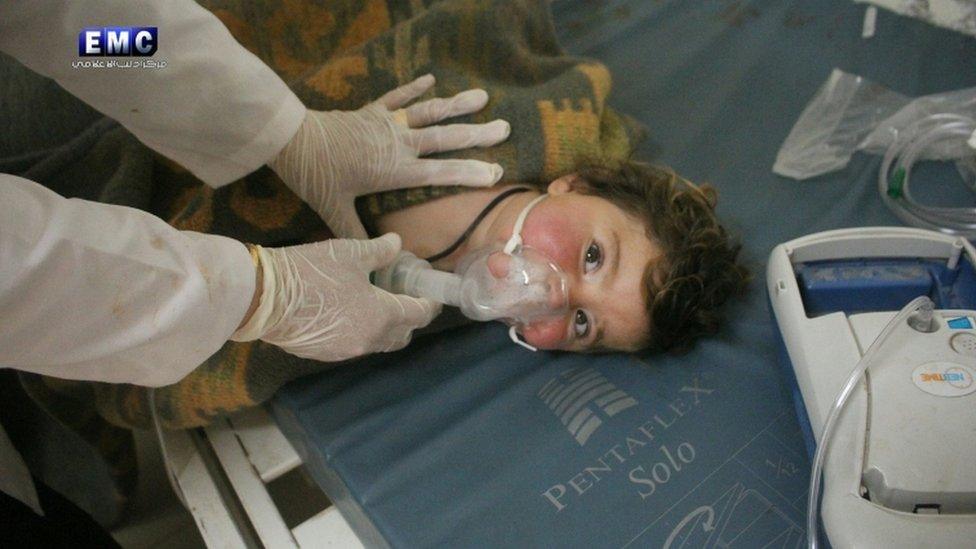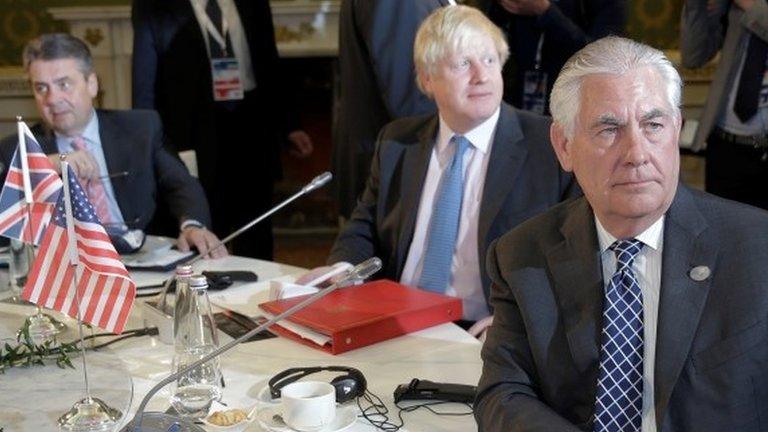Syria: Boris Johnson denies defeat over sanctions call
- Published
Boris Johnson: Russia "will want a way out"
The UK Foreign Secretary Boris Johnson has denied he suffered a "defeat" after the G7 group of nations rejected his proposal for sanctions against Russia.
The plan was put forward at the G7 summit in Italy in the wake of a deadly chemical attack the countries say was carried out by Moscow's ally, Syria.
Italy's foreign minister said the group did not want to back Russia into a corner and preferred dialogue.
The Lib Dem leader Tim Farron called it a "failure of British diplomacy".
The two-day meeting of foreign ministers was aimed at hammering out a unified approach to Syria before the US Secretary of State Rex Tillerson went to Moscow.
The BBC diplomatic correspondent James Robbins says Mr Johnson had hoped for some form of explicit support, but the final G7 communiqué does not mention sanctions.
The Italian Foreign Minister Angelino Alfano said ministers wanted to engage with Russia.
"We think the Russians have the leverage that is needed to put pressure on [President Bashar al-Assad] and to get him to observe the commitments with regard to the ceasefire," he said.
Mr Johnson denied he had suffered a defeat, saying there was support for sanctions if further evidence of the chemical attack were gathered.
One thing that did appear to unite the group was the future of Mr Assad.
Mr Tillerson summed it up, saying: "It is clear to all of us that the reign of the Assad family is coming to an end."

Rex Tillerson: Reign of Assad family coming to an end
Read more:

The G7 meeting in the Italian city of Lucca followed last week's chemical attack on the rebel-held Syrian town of Khan Sheikhoun that left 89 people dead.
The Turkish health ministry on Tuesday confirmed that the nerve agent, sarin, had been used.
Syria denied staging the attack but the US then carried out a retaliatory strike, firing 59 cruise missiles at the Syrian airbase from which the chemical attack was apparently launched.
Tim Farron, leader of the Liberal Democrats, the fourth biggest party in the House of Commons, said that he had agreed with the UK government's goal of getting fresh sanctions.
But he said that Mr Johnson was a "court jester" playing the "role of crown prince" and was not being taken seriously.

The attack on Khan Sheikhoun left 89 people dead and dozens injured
Mr Farron told the BBC that the UK government had "thrown bricks, if you like, across the Channel at our negotiating partners, at many of the countries that were around the table with us over the last couple of days."
"You will find people in other countries who will choose to take Britain less seriously, who will consider us to be less important, to be less influential, less likely to want to give us a second hearing," he added.
There were some conciliatory messages ahead of Mr Tillerson's arrival in Russia, with Moscow hoping for "constructive co-operation" with Washington.
Mr Putin hinted at this himself, saying that although Russia and Syria were being portrayed as the "common enemy" of the West, "we are ready to tolerate this", and he added: "We hope that this will nonetheless lead to some kind of positive co-operation trend."
He called for the UN to hold an independent investigation into the chemical attack.
Mr Putin also said that he had heard that "fake chemical attacks" were being prepared, though without citing clear evidence.
He said: "We have information from various sources that such provocations - I cannot call them otherwise - are being prepared in other regions of Syria, including in the southern outskirts of Damascus, where they are again planning to throw some kind of substance and accuse Syrian official authorities of using it."
He also said he had heard that the US was planning more missile strikes. He gave no further information.
- Published11 April 2017
